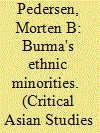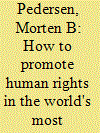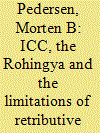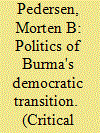|
|
|
Sort Order |
|
|
|
Items / Page
|
|
|
|
|
|
|
| Srl | Item |
| 1 |
ID:
080733


|
|
|
|
|
| Publication |
2008.
|
| Summary/Abstract |
The nearly 60-year-long fight by Burma's ethnic minorities for autonomy and ethnic rights lies at the root of the country's broader political and humanitarian crisis. Yet, in the outside world, this issue is often subsumed under the better-known struggle for democracy, led by Aung San Suu Kyi and the National League for Democracy. The present article seeks to redress this imbalance by directing attention to the numerous groups representing ethnic minority interests, the grievances and aspirations that motivate their struggle, and their own strategies for peace. It argues that in Burma's deeply divided society peace and democracy are two distinct challenges, even if in the long term they must go together, and it calls for the international community to help the country's ethnic groups prepare for future peace negotiations and overcome the debilitating legacy of war
|
|
|
|
|
|
|
|
|
|
|
|
|
|
|
|
| 2 |
ID:
119078


|
|
|
|
|
| Publication |
2013.
|
| Summary/Abstract |
For two decades, Myanmar sat at the top of the international human rights agenda. With recent political changes, this may now be a thing of the past, but the bad old days hold important lessons that should not be forgotten. This article draws on interviews conducted mainly inside Myanmar over a period of 15 years to evaluate, contrast and compare the impact of different international human rights policies on the ground. It is argued that while the effects of both Western ostracism and regional business as usual have been largely counterproductive and often harmful to the Myanmar people, principled engagement by the United Nations and other international organisations has shown significant potential to help promote human rights. This is a lesson which may be worth heeding in other repressive states.
|
|
|
|
|
|
|
|
|
|
|
|
|
|
|
|
| 3 |
ID:
170259


|
|
|
|
|
| Summary/Abstract |
The recent decision by the Prosecutor of the International Criminal Court (ICC), Mrs Fatou Bensouda, to launch preliminary investigations into the alleged deportation of 700,000 Rohingya Muslims from Myanmar to Bangladesh as a possible crime against humanity is part of a growing push to punish Myanmar’s military leaders for large-scale human rights violations committed during army ‘clearance operations’ in Northern Rakhine State (ICC 2018). The operations, which were launched in response to attacks by the Arakan Rohingya Salvation Army (ARSA) on some thirty government security posts on 25 August 2017, were found by international human rights organisations to have systematically targeted civilians, including mass killings, rape and the destruction of scores of villages (UNHRC 2018), thus causing the mass exodus.
|
|
|
|
|
|
|
|
|
|
|
|
|
|
|
|
| 4 |
ID:
103854


|
|
|
|
|
| Publication |
2011.
|
| Summary/Abstract |
Many have dismissed the military-controlled transition to "democracy" in Burma as a sham that will only further entrench military rule. Others, however, view it as an opportunity to break the army's long-standing stranglehold on power and start a process of gradual reform. The present article considers the transition from a strategic perspective. After briefly revisiting the history of military rule in Burma, it examines the politics of the transition and considers possible scenarios in the short, medium, and longer term. It concludes that, although the military clearly has no intentions of surrendering control of the government, new political leaders, institutions, and processes might open opportunities to improve governance and, over time, transform politics, especially if democrats play their cards right.
|
|
|
|
|
|
|
|
|
|
|
|
|
|
|
|
|
|
|
|
|